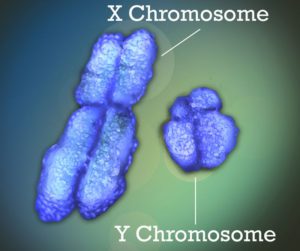

A panel of mice (strain B6) with the Y chromosome from eleven different strains were used to determine the effect of infection. The mice fell into two groups with distinct high and low survival after intranasal infection with the mouse-adapted PR8 strain of influenza virus. These results show that variation in the Y chromosome influences survival after infection. Furthermore, the previously reported greater susceptibility of female B6 mice to influenza virus infection compared with male mice is due to the presence of the Y chromosome.
Viral replication in the lung does not differ between mouse strains with high and low mortality. Increased mortality is associated with an increase in a type of T lymphocyte called gamma-delta T cells which produce interleukin 17. The latter is known to provoke lung-damaging inflammation.
Differences in susceptibility of mice with different Y chromosomes has nothing to do with the immunosuppressive effects of testosterone. Exactly which genes on the Y chromosome affect influenza virus susceptibility are unknown. Analysis of RNA expression revealed differences in levels of small RNAs in mice of higher versus lower susceptibility. This observation raises the possibility that the Y chromosome might have global effects on gene expression from other chromosomes, which in turn influences susceptibility to infection.
Others have found that the Y chromosome regulates the speed of progression to AIDS in HIV-1 infected men. It seems likely that the Y chromosome has an important general role in modulating the pathogenesis of infectious diseases. A better understanding of how the Y chromosome regulates the expression of other genes will be needed to understand these effects.

Pingback: Flu and the Y chromosome – Virology
Pingback: parasitology | [Veterinary and Medical Sciences
Y chromosomes and infectious diseases have a link!! Not good news for men.